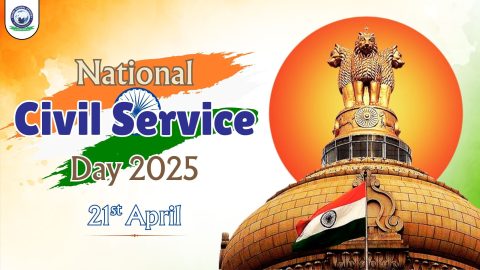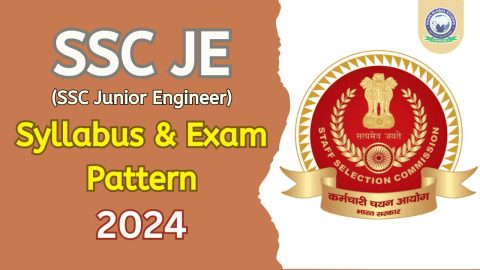The Railway Recruitment Board (RRB) will soon release the RRB JE 2024 Notification for over 8000 vacancies. Candidates aspiring for RRB JE Recruitment should acquaint themselves with the detailed syllabus and exam pattern to excel in the exam. This article covers the RRB JE Syllabus for Junior Engineers (JE), Junior Engineers (Information Technology), Depot Material Superintendents (DMS), and Chemical & Metallurgical Assistants (CMA) to aid in preparation for the RRB JE 2024 Exam. Let’s delve into the RRB JE 2024 Syllabus and exam pattern.
RRB JE (Junior Engineer) Exam Overview
| Board | Railway Recruitment Board (RRB) |
| No. of Questions | CBT 1: 100 CBT 2: 150 |
| Marking Scheme | 1 Mark for Each Right Answer |
| Negative Marking | ⅓rd Mark for Each Wrong Answer |
| Selection Process | First Stage of CBT Second Stage of CBT Document Verification Medical Examination |
| Official Website | https://rrbcdg.gov.in/ |
RRB JE Syllabus 2023
This section outlines the RRB JE syllabus for each subject in the exam. Candidates can download the RRB JE Syllabus PDF at the beginning or end of this article.
The syllabus for CBT Stage – I includes:
- Quantitative Aptitude
- General Intelligence and Reasoning
- General Science
- General Awareness
The syllabus for CBT Stage – II includes:
- Physics & Chemistry
- General Awareness
- Basics of Computer and Applications
- Technical Knowledge
- Environment and Pollution Control
RRB JE CBT Stage – I Syllabus
As per the RRB JE Syllabus, the topics for the first stage of CBT are given below:
Mathematics:
- Number Systems
- BODMAS
- Decimals
- Fractions
- LCM and HCF
- Ratio and Proportion
- Percentages
- Mensuration
- Time and Work
- Time and Distance
- Simple and Compound Interest
- Profit and Loss
- Algebra
- Geometry
- Trigonometry
- Elementary Statistics
- Square Root
- Age Calculations
- Calendar & Clock
- Pipes & Cistern
General Intelligence and Reasoning:
- Analogies
- Alphabetical and Number Series
- Coding and Decoding
- Mathematical operations
- Relationships
- Syllogism
- Jumbling
- Venn Diagram
- Data Interpretation and Sufficiency
- Conclusions and Decision-Making
- Similarities and Differences
- Analytical Reasoning
- Classification
- Directions
- Statement – Arguments and Assumptions etc.
General Awareness:
- Knowledge of Current affairs
- Indian Geography
- Culture and History of India including the Freedom Struggle
- Indian Polity and Constitution
- Indian Economy
- Environmental issues concerning India and the World, Sports, General scientific and Technological Developments etc.
General Science:
- Physics, Chemistry and Life Sciences (up to 10th Standard CBSE syllabus).
RRB JE CBT Stage – II Syllabus
As per the RRB JE Syllabus, the topics for the second stage of CBT are given below:
General Awareness:
- Knowledge of Current affairs
- Indian Geography
- Culture and History of India including the Freedom Struggle
- Indian Polity and Constitution
- Indian Economy
- Environmental Issues concerning India and the World, Sports, General Scientific and Technological Developments etc.
Physics & Chemistry:
- Up to 10th Standard CBSE Syllabus and Relevant Basics.
Basics of Computer and Applications:
- Computers and their Architecture
- Input & Output devices
- MS Office
- Storage Devices
- Operating Systems
- Internet and Email
- Websites & Web Browsers
- Networking
- Computer Virus
Basics of Environment and Pollution Control
- Basics of Environment
- The Adverse Effects of Environmental Pollution
- Pollution Control Strategies
- Types of Pollution
- Waste Management
- Global Warming
- Acid Rain
- Ozone Depletion
Technical Abilities
Mechanical & Allied Engineering:
- Engineering Mechanics
- Material Science
- Strength of Materials
- Machining
- Welding
- Grinding & Finishing Process
- Metrology
- Fluid Mechanics & Hydraulic Machinery
- Industrial Management
- Thermal Engineering
Computer Science and Information Technology:
- PC Software
- Computer fundamentals
- C Language
- Computer Organisation
- Information Systems
- Data Structure using C++
- DBMS fundamentals
- System Programming
- Operating System using LINUX
- Web Technologies and Programming
- System Analysis and Design
- Data and Network Communication
- Java Programming
- Software Engineering
Civil & Allied Engineering:
- Engineering Mechanics
- Building Construction
- Building materials
- Construction of substructure
- Construction of superstructure
- Building finishes
- Building maintenance
- Building Drawing
- Concrete Technology
- Surveying
- Computer-Aided Design
- Geo Technical Engineering
- Hydraulics
- Irrigation Engineering
- Mechanics of Structures
- Theory of structures
- Design of Concrete Structures
- Design of Steel Structures
- Transportation Engineering
- Environmental Engineering
- Highway Engineering
- Advanced Construction Techniques and Equipment
- Estimating and Costing
- Contracts and Accounts
Electrical & Allied Engineering:
- Basic concepts
- Circuit law
- Magnetic Circuit
- AC Fundamentals
- Measurement and measuring instruments
- Electrical Machines
- Synchronous Machines
- Generation, Transmission and Distribution
- Estimation and costing
- Utilization of Electrical Energy
- Basic Electronics
Electronics & Allied Engineering:
- Electronic Components & Material
- Electronic Devices and circuits
- Digital Electronics
- Linear Integrated Circuit
- Microprocessor and Microcontroller
- Electronic Measurements
- Communication Engineering
- Data Communication and Network
- Computer Programming
- Basic Electrical Engg.
Printing Technology:
- Printing Systems
- Printing Materials
- Flexo, Gravure and Screen Printing
- Printing Finishing Processing
- Image Processing
- Design & Advertising in Print Media
- Sheet-fed offset Machines
- Publishing Software
- Paper and Ink
- Colour Separation and Management
- Plate Making Methods
- Printing Machine Maintenance
- Digital Imaging
- Web offset Printing
- Printer’s Accounting and Estimating
- Advanced Printing Technologies
- Package Technology
RRB JE Exam Pattern
The RRB JE Exam Pattern comprises the following 4 stages:
- First Stage of CBT
- Second Stage of CBT
- Document Verification / Medical Examination
- Final Selection
The detailed RRB JE exam pattern is provided below:
| RRB Exam | Subjects | Question | Mark | Time Duration |
| CBT 1 | Mathematics | 30 | 30 | 90 Minutes |
| General Intelligence & Reasoning | 25 | 25 | ||
| General Awareness | 15 | 15 | ||
| General Science | 30 | 30 | ||
| CBT 2 | General Awareness | 15 | 15 | 120 Minutes |
| Physics & Chemistry | 15 | 15 | ||
| Basics of Computer and Applications | 10 | 10 | ||
| Basics of Environment and Pollution Control | 10 | 10 | ||
| Technical Abilities | 100 | 100 |
Some Effective Preparation Tips for the RRB JE Exam
Here are some preparation tips for the RRB JE exam:
- Understand the syllabus: Familiarize yourself with the RRB JE syllabus for both CBT Stage I & II. Make sure you cover all the topics mentioned in the syllabus.
- Make a study plan: Develop a study plan that allocates adequate time for each subject. Prioritize the topics based on their importance in the exam and your proficiency level.
- Focus on Basics: Build a strong foundation in core subjects like Quantitative Aptitude, General Intelligence & Reasoning and General Science. Understand the fundamental concepts thoroughly.
- Refer to the Standard Study Material: Use the recommended textbooks and study material to complete your preparation. Use online resources and video tutorials to understand complex topics better.
- Revision Regularly: Schedule regular revision sessions to reinforce your learning and retain important concepts. Make short notes for quick revision before the exam.
- Stay Updated: Keep yourself updated with current affairs, especially topics related to general awareness, environment and pollution control. Follow news updates and read newspapers regularly.
- Manage Time Effectively: Practice time management techniques during your preparation and mock tests. Learn to prioritize questions and allocate time accordingly to maximize your score.
- Be Positive and Confident: Maintain a positive attitude during your preparation journey. Believe in your abilities and be confident while taking the exam.
- Take Care of yourself: Make sure you get an adequate amount of rest, exercise and healthy food during your preparation period. A balanced lifestyle will help you stay focused and perform better on exam day.
By following these preparation tips and maintaining a consistent study routine, you can increase your chances of success in the RRB JE exam.



